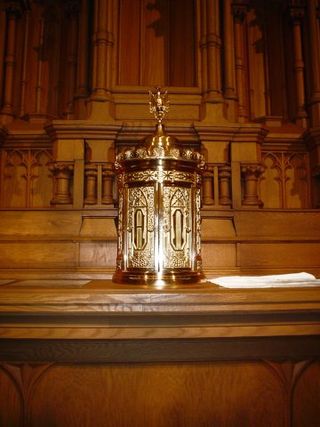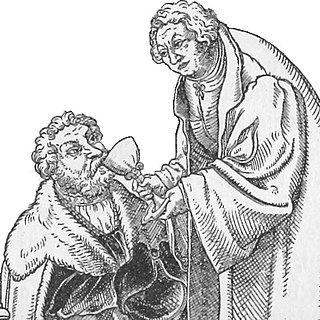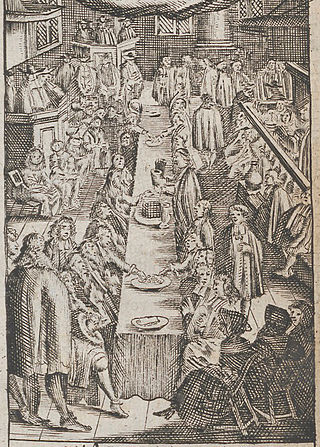
Transubstantiation is, according to the teaching of the Catholic Church, "the change of the whole substance of bread into the substance of the Body of Christ and of the whole substance of wine into the substance of the Blood of Christ". This change is brought about in the eucharistic prayer through the efficacy of the word of Christ and by the action of the Holy Spirit. However, "the outward characteristics of bread and wine, that is the 'eucharistic species', remain unaltered". In this teaching, the notions of "substance" and "transubstantiation" are not linked with any particular theory of metaphysics.
This article contains information about the literary events and publications of 1523.

The Feast of Corpus Christi, also known as the Solemnity of the Most Holy Body and Blood of Christ, is a Christian liturgical solemnity celebrating the Real Presence of the Body and Blood, Soul and Divinity of Jesus in the elements of the Eucharist; it is observed by the Latin Church, in addition to certain Western Orthodox, Lutheran, and Anglican churches. Two months earlier, the institution of the Eucharist at the Last Supper is observed on Maundy Thursday in a sombre atmosphere leading to Good Friday. The liturgy on that day also commemorates Christ's washing of the disciples' feet, the institution of the priesthood, and the agony in the Garden of Gethsemane.
Crypto-Calvinism is a pejorative term describing a segment of those members of the Lutheran Church in Germany who were accused of secretly subscribing to Calvinist doctrine of the Eucharist in the decades immediately after the death of Martin Luther in 1546. It denotes what was seen as a hidden Calvinist belief, i.e., the doctrines of John Calvin, by members of the Lutheran Church. The term crypto-Calvinist in Lutheranism was preceded by terms Zwinglian and Sacramentarian. Also, Jansenism has been accused of crypto-Calvinism by Roman Catholics.

A monstrance, also known as an ostensorium, is a vessel used in Roman Catholic, Old Catholic, High Church Lutheran and Anglican churches for the display on an altar of some object of piety, such as the consecrated Eucharistic Sacramental bread (host) during Eucharistic adoration or during the Benediction of the Blessed Sacrament. A monstrance may also serve as a reliquary for the public display of relics of some saints. The word monstrance comes from the Latin word monstrare, while the word ostensorium comes from the Latin word ostendere. Either term, each expressing the concept of "showing", can refer to a vessel intended for the exposition of the Blessed Sacrament, but ostensorium has only this meaning.

In Christian theology, the term Body of Christ has two main but separate meanings: it may refer to Jesus Christ's words over the bread at the celebration of the Jewish feast of Passover that "This is my body" in Luke 22:19–20, or it may refer to all individuals who are "in Christ" 1 Corinthians 12:12–14.

Eucharistic adoration is a Eucharistic devotional practice primarily in Western Catholicism, but also to a lesser extent in certain Lutheran and Anglican traditions, in which the Blessed Sacrament is adored by the faithful. This practice may occur either when the Eucharist is exposed, or when it is not publicly viewable because it is reserved in a place such as a church tabernacle.

A tabernacle or a sacrament house is a fixed, locked box in which the Eucharist is stored as part of the "reserved sacrament" rite. A container for the same purpose, which is set directly into a wall, is called an aumbry.

Hermann Otto Erich Sasse was a German Lutheran pastor, theologian, and author. He was considered one of the foremost confessional Lutheran theologians of the 20th century.
Confession Concerning Christ's Supper (1528) is a theological treatise written by Martin Luther affirming the Real Presence of the body and blood of Christ in the Eucharist, defining Luther's position as the sacramental union. Notable among its respondents were Huldrych Zwingli and Johannes Oecolampadius, who denied the Real Presence. Luther also discussed the eucharistic views of John Wycliffe in this document. The third part of the work is a concise confession of Luther's Christian faith.

During the Liturgy of the Eucharist, the second part of the Mass, the elements of bread and wine are considered to have been changed into the veritable Body and Blood of Jesus Christ. The manner in which this occurs is referred to by the term transubstantiation, a theory of St. Thomas Aquinas, in the Roman Catholic Church. Members of the Orthodox, Anglican, and Lutheran communions also believe that Jesus Christ is really and truly present in the bread and wine, but they believe that the way in which this occurs must forever remain a sacred mystery. In many Christian churches, some portion of the consecrated elements is set aside and reserved after the reception of Communion and referred to as the reserved sacrament. The reserved sacrament is usually stored in a tabernacle, a locked cabinet made of precious materials and usually located on, above, or near the high altar. In Western Christianity usually only the Host, from Latin: hostia, meaning "victim", is reserved, except where wine might be kept for the sick who cannot consume a host.

Anglican eucharistic theology is diverse in practice, reflecting the comprehensiveness of Anglicanism. Its sources include prayer book rubrics, writings on sacramental theology by Anglican divines, and the regulations and orientations of ecclesiastical provinces. The principal source material is the Book of Common Prayer, specifically its eucharistic prayers and Article XXVIII of the Thirty-Nine Articles. Article XXVIII comprises the foundational Anglican doctrinal statement about the Eucharist, although its interpretation varies among churches of the Anglican Communion and in different traditions of churchmanship such as Anglo-Catholicism and Evangelical Anglicanism.

Andreas Musculus was a German Lutheran theologian and Protestant reformer.
Gnesio-Lutherans is a modern name for a theological party in the Lutheran churches, in opposition to the Philippists after the death of Martin Luther and before the Formula of Concord. In their own day they were called Flacians by their opponents and simply Lutherans by themselves. Later Flacian became to mean an adherent of Matthias Flacius' view of original sin, rejected by the Formula of Concord. In a broader meaning, the term Gnesio-Lutheran is associated mostly with the defence of the doctrine of Real Presence, along with the practice Eucharistic adoration.
Andreas Poach was a German Lutheran theologian and Reformer.
In Lutheranism, the Eucharist refers to the liturgical commemoration of the Last Supper. Lutherans believe in the real presence of Christ in the Eucharist, affirming the doctrine of sacramental union, "in which the body and blood of Christ are truly and substantially present, offered, and received with the bread and wine."
The Lutheran sacraments are "sacred acts of divine institution". They are also defined as “an outward and visible sign of an inward and spiritual grace.”.

The Sacrament of the Body and Blood of Christ—Against the Fanatics is a book by Martin Luther, published in late September or early October 1526 to aid Germans confused by the spread of new ideas from the Sacramentarians. At issue was whether Christ's true body and blood were present in the Lord's Supper, a doctrine that came to be known as the sacramental union.

In Reformed theology, the Lord's Supper or Eucharist is a sacrament that spiritually nourishes Christians and strengthens their union with Christ. The outward or physical action of the sacrament is eating bread and drinking wine. Reformed confessions, which are official statements of the beliefs of Reformed churches, teach that Christ's body and blood are really present in the sacrament and that believers receive, in the words of the Belgic Confession, "the proper and natural body and the proper blood of Christ." The primary difference between the Reformed doctrine and that of Catholic and Lutheran Christians is that for the Reformed, this presence is believed to be communicated in a spiritual manner by faith rather than by oral consumption. The Reformed doctrine of real presence is called "pneumatic presence".
Benedictine Nuns of Perpetual Adoration of the Blessed Sacrament is an female enclosed Catholic order founded in Paris, France in 1653 by Mechtilde of the Blessed Sacrament.









